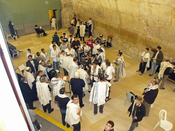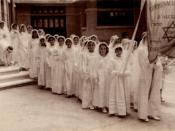In all religions and traditions, there are always customs and ÃÂRites of PassageÃÂ to follow. In Catholicism, for example, there are sacraments that the parishioners are expected to fulfill. Baptism, Reconciliation, and Confirmation are just a few of the many sacraments to strive for as a Catholic child.
The same ideas are carried over into the Jewish Tradition. These ÃÂRites of PassageÃÂ date back many more years then many of the other religionÃÂs ceremonies; back to the time of Abraham. The Jewish Tradition has such Rites of Passage as circumcision, Bar/Bat Mitzvah, choosing a name, marriage and death. To talk about all of them would take days and many typed pages. In this paper, the intent is to focus in on just a few.
For many outsiders circumcision and Bar Mitzvah seem to be very compelling. Each Rite of Passage is done for a certain reason and follows a certain process, in order to fulfill GodÃÂs will.
When a Jewish woman is in her ninth month of pregnancy, she begins to start thinking about the circumcision ceremony that will take place eight days after the birth, if she has a son. The circumcision ceremony must happen the morning of the eighth day of life, unless the boy is in no condition to have it performed. If the boy is ill or hospitalized then the family will wait until the next available day the boy can handle the procedure. Many times the child is born with jaundice. In this case the circumcision obviously has to wait.
Jewish people have trained specialists who perform the circumcision. These trained specialists are called the Mohel. In the early days of Judaism, the sonÃÂs father would also sometimes perform the ceremony. However, most commonly now, the Mohel is designated as the person to perform the...


